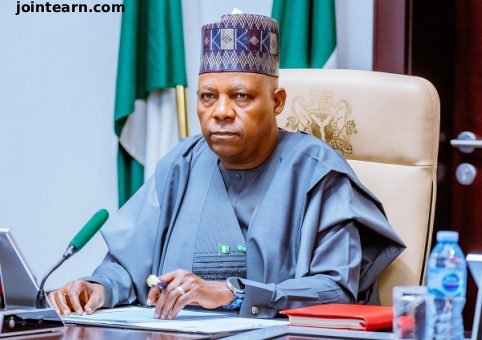
Vice President Kashim Shettima has declared that the era of economic volatility and uncertainty in Nigeria is over, crediting President Bola Ahmed Tinubu’s bold reforms for restoring stability and investor confidence.
Speaking in Abuja at the opening ceremony of the Digital Nigeria International Conference and Exhibition 2025, Shettima said the administration’s reforms were stabilising the economy and creating an enabling environment for investment and innovation.
‘Tinubu’s Reforms Restoring Investor Confidence’
According to the Vice President, the government’s decisions were responses to global economic challenges marked by shocks, shifting alliances, and the rapid transformation of industries by emerging technologies.
He pointed out that the impact of these reforms was already evident in the positive ratings recently assigned to Nigeria by global agencies.
“Fitch’s upgrade of Nigeria’s sovereign rating to B with a stable outlook, and Moody’s lifting of our issuer rating to B3, are clear signals that the world is taking note of the steady course we are maintaining,” Shettima said in a statement signed by his Senior Special Assistant on Media and Communications, Stanley Nkwocha.
He added:
“What this administration has achieved is to end the regimes of volatility and unpredictability that once defined our economy. The phase before us now is to ensure that these macroeconomic gains trickle down to the people—from the kiosks of neighbourhood traders to the boardrooms of multinational corporations.”
Driving Digital Transformation for Inclusive Growth
Shettima stated that Nigeria’s long-term economic stability depends on embracing digital transformation. He noted that the conference’s theme — “Innovation for a Sustainable Digital Future: Accelerating Growth, Inclusion, and Global Competitiveness” — aligns with President Tinubu’s vision of a tech-driven, inclusive economy.
“We need a digital ecosystem that works as seamlessly in Lagos as it does in Abuja, Port Harcourt, Kano, Gusau, and across every corner of our nation,” he said.
The Vice President illustrated how a fully connected digital economy could empower ordinary Nigerians, enabling “a farmer in Bida to access real-time market data” or “a young woman in Oguta to work remotely for a global company.”
He stressed that Nigeria must seize the “redemptive opportunity” offered by the digital revolution to redefine its place in the global economy, describing President Tinubu as “a man of a thousand visions — a patriot and reformer suited for this transformative era.”
People, Infrastructure, and Policy as Key Pillars
Outlining the administration’s digital and economic strategy, Shettima identified three core pillars — people, infrastructure, and policy — as central to achieving sustainable growth.
He cited ongoing programmes such as Digital Literacy for All (DL4ALL) and the 3 Million Technical Talent (3MTT) initiative as key components for building capacity and empowering young Nigerians.
The Vice President also disclosed that the National Digital Economy and e-Governance Bill was in its final stage at the National Assembly. Once passed, it would usher in “smarter governance, greater transparency, and inclusive service delivery.”
Private Sector Collaboration Key to Success
Shettima called for stronger private sector participation, describing industry leaders as “the innovators, disruptors, and dreamers who turn possibilities into progress.”
Minister of Communications, Innovation, and Digital Economy, Dr. Bosun Tijani, praised the administration’s policies for laying a foundation for digital infrastructure and urged stakeholders to deepen collaboration.
Also speaking, the Director-General of NITDA, Kashifu Inuwa Abdullahi, commended the Vice President for championing youth-focused technology programmes, while Dr. Vincent Olatunji, CEO of the Nigeria Data Protection Commission, highlighted the economic opportunities embedded in Nigeria’s growing digital landscape.


Leave a Reply